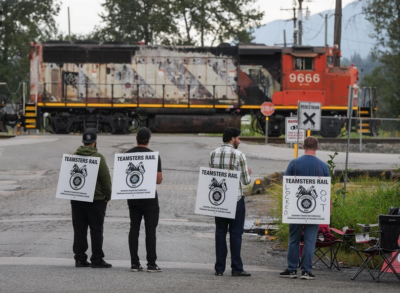September 2nd, 2024
BURLINGTON, ON
OPINION
Labour Day, the day the union membership takes to the streets and march in a parade to celebrate the gains that unions have won for their membership.
And indeed, the union movement has made great strides in not only the wages workers are paid but the conditions the men and women who toil at the machines and keep the wheels moving on the trains, streetcars and buses.
Like any organization – unions at times have difficulty adapting to change.

Drawing in participation from every union out there is always the objective for the Labour Day parade.
The recent strike by the railway workers that brought the movement of goods by rail was scheduled to come to a complete halt – which would have meant a total halt and perhaps more importantly, a significant, serious hit to the economy of the country.
At a time when Canadians, coast to coast to coast are still recovering from the pandemic a self-inflicted hit to the economy was not what the country needed.
The Industrial Relations Board accepted a request from the government to order more than 9,000 Teamsters members back to work at Canadian National Railway CNR.TO and Canadian Pacific Kansas City and to impose binding arbitration.
In the past unions have usually done rather well with binding arbitration.

The unions had several important issues – and they weren’t about to let anyone forget what they wanted.
However, that wasn’t enough for the unions. They have taken the binding arbitration process imposed by the federal government to Court.
The union had already said it would appeal the rulings on the grounds that arbitration could lead to the imposition of future contracts, eroding workers’ bargaining power.
“These decisions, if left unchallenged, set a dangerous precedent where a single politician can bust a union at will,” said Paul Boucher, president of the Teamsters rail union.
The union representing workers at Canada’s two main rail companies said on Friday it had filed court challenges against rulings by the country’s industrial labor board that forced them back to work.
The railway workers have however agreed to return to work while the Courts hear the arguments – so this mess isn’t over quite yet.
Some have suggested railway should ne nationalized. In the longer run nationalization just hasn’t worked.
We are at a point where labour relations and essential industries have to evolve; there is a need to find better ways of ensuring that the economy can function while workers have rights that are legitimate and need to be met.
“The right to collectively bargain is a constitutional right and cannot be taken lightly.
March 13, 1872 typesetters wanted to strike asking for a 9 hour working day.
The strike began on March 25. George Brown, publisher of The Globe (now The Globe and Mail), vehemently opposed the strike, and arranged for the arrest of its leaders.
Strike supporters rallied again in large numbers at Queen’s Park on April 15, 1872. Twenty-three TTU organizers were arrested for conspiracy on April 16, and a trial began on April 18.
At the time, Canadian law made no exception for unions to the general common law rules governing the crime of conspiracy: a union committee’s “conspiracy” to disrupt a commercial enterprise with a strike was no different in law from any other agreement to disturb the peace. The organizers were accordingly convicted.
Shortly after the Queen’s Park rally, Prime Minister John A. MacDonald introduced the Trade Unions Act, 1872 in the House of Commons, which made certain forms of union activity legal. The Trade Union Act 1871 and Criminal Law Amendment Act 1871. It passed on June 14, 1872.
Salt with Pepper is the musings, reflections and opinions of the publisher of the Burlington Gazette, an online newspaper that was formed in 2010 and is a member of the National Newsmedia Council.

















I worked under and was proud to be a member of both the O.C.A.W and C.A.W unions for 10 years. I signed a card to organize a union because two of my fellow workers were terminated without due process. I regularly attended meetings and ran for office. I did not like the fact that part of my dues also supported one political party.
The lessons learned while being a union member served me well later in management roles, some of the lessons are as follows.
Treat your employees the way you want to be treated.
Listen to them.
Remove any barriers that prevent them from doing their job.
Reward them with competitive wages and benefits.
Ensure they have a safe environment.
Communicate with them on a regular basis.
Practice management by walking around aka M.B.W.A.